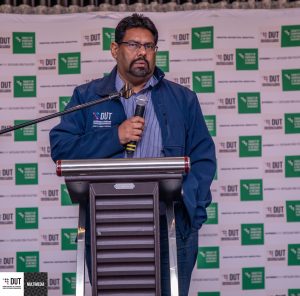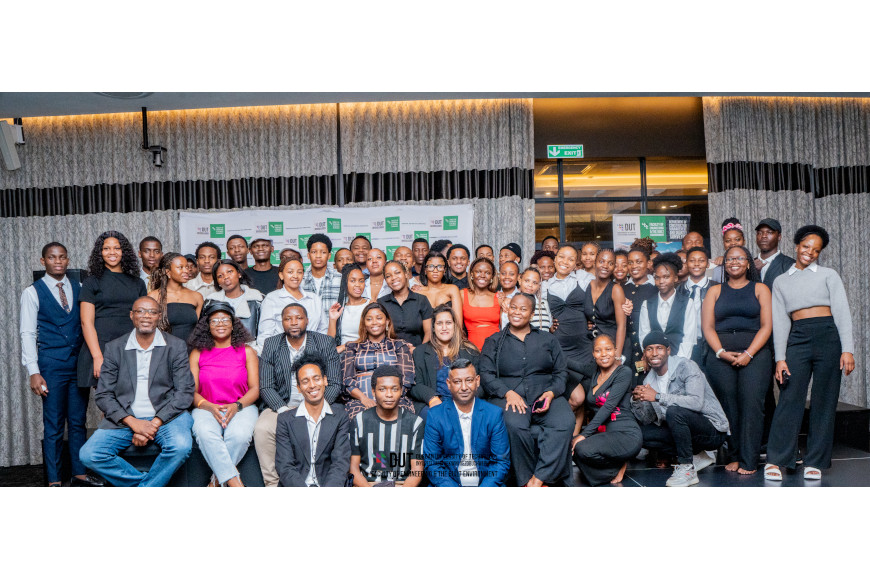The Department of Construction Management and Quantity Surveying at the Durban University of Technology (DUT) recently hosted the Project‑Based Learning (PBL) Mini conference, a one‑day event that highlighted Project‑Based Learning and Design Thinking as transformative teaching tools at Coastlands Hotel, Musgrave.
Partnering with the external stakeholder South African Facilities Management Association (SAFMA), the conference brought together academics, industry professionals, and students to explore how these approaches can reshape construction education.
Programme Director, Professor Rendani Maladzi, Associate Professor in Mechanical Engineering, set the tone for the event, opening the floor for successful conversations and engagements. His keynote emphasised the synergy between experiential learning and real‑world construction challenges, framing the day’s discussions.
Professor Sudesh Rathilal, Executive Dean of the Faculty of Engineering and the Built Environment, delivered opening remarks, providing context for Problem‑Based Learning (PBL).
 “It is my honour to address you today at this Problem-Based Learning Mini-Conference. PBL is not just another teaching method , it is a transformative approach that turns learning into active problem-solving. It prepares students to think critically, collaborate, and apply knowledge in real-world contexts, bridging the gap between the classroom and the workplace. This conference is therefore more than an academic gathering. It is a seed for innovation, a space where students, academics, and industry experts work together to shape the future of our built environment. Challenges like sustainable infrastructure, facilities management, and urban development demand exactly this kind of collaborative, practical approach,” said Prof Rathilal.
“It is my honour to address you today at this Problem-Based Learning Mini-Conference. PBL is not just another teaching method , it is a transformative approach that turns learning into active problem-solving. It prepares students to think critically, collaborate, and apply knowledge in real-world contexts, bridging the gap between the classroom and the workplace. This conference is therefore more than an academic gathering. It is a seed for innovation, a space where students, academics, and industry experts work together to shape the future of our built environment. Challenges like sustainable infrastructure, facilities management, and urban development demand exactly this kind of collaborative, practical approach,” said Prof Rathilal.
PBL project leader Mr Sisa Mbeki gave the purpose of the day, emphasising the importance of the PBL mini‑conference and urging students to grasp every piece of information shared. He highlighted that the event serves as a platform for showcasing innovative projects, fostering collaborative learning, and strengthening research skills.
Dr Shoba Rathilal, Director of the DUT Centre for Excellence in Learning and Teaching, addressed the DUT Teaching and Learning priorities. She spotlighted strategic focus areas, including innovative pedagogy, digital transformation, student engagement, and assessment reform. Emphasis was placed on fostering collaborative learning environments and supporting faculty development through workshops and mentorship programs. Dr Rathilal also underscored the importance of data‑driven decision making to enhance curriculum design and improve academic outcomes. She encouraged ongoing dialogue among staff and students to refine practices.
Academic Development Practitioner for the faculty of Engineering and Built Environment, Dr Zanele Hadebe delve deep into the issue of student disengagement and the steps they are taking to address it as the faculty.
“Our students are often on their phones, and attendance has been a challenge. In response, we’ve been exploring various methodologies to adapt to the needs of 21st-century learning. One approach that has shown promising results is Design Thinking, which seems to resonate well with our students. Through these projects, we’ve seen many of the principles discussed in ENVISION2030 being put into practice. We are encouraged by the noticeable improvements in both attendance and pass rates since implementing these initiatives,” said Dr Hadebe.
Delivering his keynote address, South African Facilities Management Association (SAFMA) President, Mr Batabile Sibaca urged students to embrace entrepreneurship, highlighting that this path empowers them to turn innovative ideas into reality and actively shape the future of the construction industry. He emphasised that by launching their own ventures, graduates can drive sustainable practices, introduce fresh technologies, and influence industry standards.
“We are here today to support this initiative and prepare you for the industry. It is our duty as the industry partner to support students and pave way for the future. What I do not like is that a lot of graduates leave university to get employed and they stay as employees forever. I think with all the knowledge that you have, you should be business owners because the future and growth of this industry depend on entrepreneurship,” said Mr Sibaca.
Students then took the stage for a series of presentations that illustrated the power of PBL. After each group shared their projects, panelists provided constructive feedback, highlighting strengths and suggesting refinements to enhance the research. This dialogue helped students identify gaps, improve methodology, and strengthen their conclusions. The feedback session fostered a collaborative learning environment, encouraging participants to reflect on their work and consider new perspectives.
The event concluded with closing remarks from the Department of Construction Management & Quantity Surveying Head of Department, Professor Molusiwa Ramabodu, who reflected on the conference proceedings and expressed appreciation to SAFMA leadership and all attendees.
Pictured: Staff, students and industry partners at the PBL Mini-Conference.
Photographer: Multimedia
Thubelihle Dumakude

